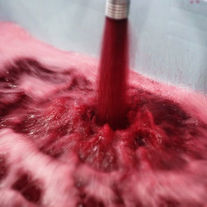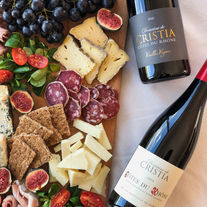

A story
The beginning
Created by Etienne Grangeon in the 1950s, the property originally spread over 2 hectares of Grenache and grew under the leadership of Alain, his son, who joined the estate in 1963. Passionate about viticulture, he notably contributed to the expansion of the estate by planting important grape varieties such as Syrah and Mourvèdre created the Cristia identity, based on knowledge and respect for its predominantly sandy soils.
The renaissance
When Baptiste and Dominique joined their father in 1999, their priorities were to orient their work towards an optimal plot selection so as to produce high quality wines and to market them both in France for export.
Today
The expertise
Today, 3 generations of winegrowers share their passion and their know-how on the 42 hectares of Domaine de Cristia, spread over the Châteauneuf-du-Pape appellations (18 hectares of red and 1 hectare of white), Côtes-du -Rhône Villages (9 hectares), Côtes-du-Rhône (5 hectares) and Vin de Pays (9 hectares).
Many projects were added and made the Domaine de Cristia grow, build itself and become more and more anchored within the Châteauneuf-du-Pape appellation. Discover the biggest project in the "The Cristia experience" section ...


DE LA VIGNE...
la viticulture et la vinification

The soils
Composed of 90% of sandy soils located in the eastern sector of the appellation (locality "Cristia"), the plots of Châteauneuf-du-Pape benefit from a north-eastern exposure, which gives the vines a beautiful freshness and produces grapes and wines with supple and elegant tannins.
A single parcel, located in the place called "l'Arnesque" to the east of the appellation, is covered with rolled pebbles which bear witness to the passage of the Rhône, and enjoys permanent sunshine. The heat absorbed during the day is thus restored at night, which allows the maintenance of a constant temperature and therefore optimal phenolic and alcoholic maturities.
This combination of different terroirs is ideal for obtaining Châteauneuf-du-Pape, combining finesse, density, richness and elegance, as well as great aging potential. The Côtes-du-Rhône Villages, Côtes-du-Rhône and Vin de Pays plots are spread over the Municipality of Courthézon, on the edge of the Châteauneuf-du-Pape appellation. The terroirs there are essentially sandy and make it possible to produce wines in the same line as the Châteauneuf-du-Pape.
The grapes
THE REDS
The predominant grape variety of Crisitia is the Grenache which accounts for nearly 85% of all the appellations. This very vigorous and fertile cépage has an excellent resistance to wind and dry weather, very suited to the Provencal climate and gives an aromatic bouquet of black fruit, kirsch, cassis and game.
Syrah, which accounts for around 10%, is a grape which has a good resistance to oxidation. It is deeply coloured with a fine structure of tannin and possesses aromatic notes of raspberry, cassis, violet and peppers.
The Mourvèdre accounts for around 5%. This variety also has a tannic structure and intense aromas of pepper, game, truffle and garrigue and completes the blend.
THE WHITES
The noble blend of Grenache blanc for the power, the Clairette for the fruit, the Roussane for the body and the Bourboulenc for the freshness makes the white Châteauneuf-du-Pape, finely balanced and seductive.



The viticulutre
The work in the vineyards is as natural as possible in accordance with the criteria of organic agriculture and the domaine received official certification from the 2008 vintage. No chemical fertlizers, herbicides or pesticides are used to treat the soils or the vines.
Ploughing and weeding are practiced according to the blocks and the yields we desire. Vines are treated with copper sulphate and sulphur occasionally blended with a nettle infusion/tea (4 to 5 times a year). Only organic fertlizer is used – i.e. sheep manure.
...AU CHAI
la viticulture et la vinification
THE REDS
The predominant grape variety of Crisitia is the Grenache which accounts for nearly 85% of all the appellations. This very vigorous and fertile cépage has an excellent resistance to wind and dry weather, very suited to the Provencal climate and gives an aromatic bouquet of black fruit, kirsch, cassis and game.
Syrah, which accounts for around 10%, is a grape which has a good resistance to oxidation. It is deeply coloured with a fine structure of tannin and possesses aromatic notes of raspberry, cassis, violet and peppers.
The Mourvèdre accounts for around 5%. This variety also has a tannic structure and intense aromas of pepper, game, truffle and garrigue and completes the blend.
THE WHITES
The noble blend of Grenache blanc for the power, the Clairette for the fruit, the Roussane for the body and the Bourboulenc for the freshness makes the white Châteauneuf-du-Pape, finely balanced and seductive.

_edited.png)



















